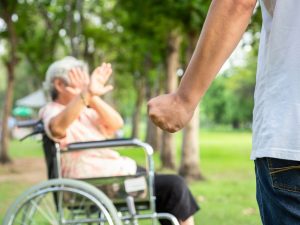Older adults may be frail or live with disabling chronic conditions, like dementia or Alzheimer’s disease. Being in a vulnerable condition makes them susceptible to elder abuse. But caregivers who are wrongly accused of abusing a senior must know their legal rights and the actions to take to protect themselves. Home Caregivers are tasked with a demanding job: providing quality care to an elderly individual, oftentimes for several hours a day, over months or years. They can be fraught with anger, frustration, and exhaustion. Caregivers who are burned out might resort to abusing or neglecting the care recipient.
What are Types of Elder Abuse?
Abuse may take place in the senior’s home by family members, friends, or hired caregivers. It is not uncommon for nursing home staff to be accused of elder abuse. In fact, nursing homes run rampant with physical, sexual, and emotional abuses as well as neglect of residents’ basic needs.

Physical Abuse
A study conducted by the World Health Organization (WHO) found that 9 percent of nursing home staff admitted to physically assaulting an elderly resident. Examples of physical abuse include kicking or punching, restraining the senior with straps, and shoving the older adult.
Seniors who undergo physical abuse in these facilities endure broken bones, bruises, and bleeding. Without proper medical attention, abuse victims suffer serious injuries or even death. Elder abuse also assumes other forms, such as medication errors, malnutrition, and ignoring residents’ complaints.
Emotional Abuse
Depression, anxiety, and post-traumatic stress disorder are outcomes of emotional abuse. Examples include insulting the senior’s appearance, threatening the older individual, and isolating the senior from loved ones. A senior who undergoes emotional abuse experiences changes to their mood or behavior.
Financial Abuse
Financial abuse can be committed by members of the senior’s social circle, such as friends, family members, or caregivers. Types of financial abuse include manipulating bank accounts, inheritance fraud, using the senior’s credit card, taking out a second mortgage in their name, and withholding their financial resources.
Do Misunderstandings and False Accusations Occur?
While clear neglect and other forms of elder abuse are serious crimes that warrant second-degree felony charges, sometimes caregivers, friends, or family members are falsely accused of elder abuse. Misunderstandings or a senior’s dementia can put caregivers at risk of being wrongly accused.
For example, a family member who notices black-and-blue bruises on a senior’s arm may suspect a caregiver has intentionally physically abused them—although the injuries resulted from an accidental trip and fall. In this case, the older adult’s injuries are not due to neglect but an accident.
Dementia and mental health conditions may cause an elderly patient to point fingers when no crime has been committed. Due to the confusion associated with dementia, a senior may honestly believe they have been a victim of elder abuse when misconduct did not actually occur.
Family members themselves may become tangled in squabbles about receiving monetary gifts or a larger share of the senior’s estate. False accusations of financial elder abuse fly. The adult children may accuse siblings or relatives of stealing money or property from the aging parent.
Why are Wrongful Accusations Significant?
Wrongful accusations are damaging, as they destroy the caregiver’s reputation. They can lead to criminal charges, jail time and fines, and strain relationships. Due to the serious repercussions, caregivers who have done nothing wrong should understand their legal rights and protect themselves.
When an individual files a complaint to law enforcement about elder abuse, the authorities will investigate. If appropriate, an arrest is made and criminal charges are brought. A trial begins if the prosecutor files charges. A prison sentence of up to 15 years follows upon conviction.
Knowingly filing a false claim of elder abuse comes with legal consequences. The individual is faced with a third-degree felony charge. If convicted, the penalties include prison time or hefty fines. The Department of Children and Family Services may fine the accuser up to $10,000 for false accusations.
What Legal Recourse Do the Falsely Accused Have?
The resulting damage to reputation and lost income from false accusations of elder abuse should prompt the wrongly accused to take immediate legal action. A civil lawsuit against the accuser can lead to compensation. A lawsuit requires the services of a qualified and experienced attorney.
A criminal defense attorney is positioned to help the wrongly accused navigate the complex legal processes and build a defense that restores their client’s reputation. The legal professional can also show that the accused’s actions do not meet the criteria for elder abuse.
A powerful legal defense is critical when someone makes false allegations and presents evidence in court that makes the wrongly accused appear guilty. The legal team examines the evidence and aggressively defends the falsely accused, thereby taking control of the issue.

Work With Elder Law Attorney in Illinois
 Elder abuse is an unfortunate reality. However, individuals might be wrongly accused of crimes. When you face a false allegation of elder abuse, the competent legal team at Berry K Tucker & Associates is ready to listen to your story, prepare a strong defense, and bring about justice.
Elder abuse is an unfortunate reality. However, individuals might be wrongly accused of crimes. When you face a false allegation of elder abuse, the competent legal team at Berry K Tucker & Associates is ready to listen to your story, prepare a strong defense, and bring about justice.
Our elder law attorneys are experienced in fulfilling the diverse legal needs of seniors. We handle a vast array of cases, representing the elderly involved in disputes about nursing homes and assisted living. Our comprehensive legal services include end-of-life planning, estate planning, and guardianship.
At Berry K Tucker & Associates, we possess the knowledge and experience to meet the unique needs of seniors. Our compassionate approach ensures that our clients understand all of their legal options, especially when they face tough decisions, like end-of-life planning and health care decision planning.
Whether you are falsely accused of elder abuse or must plan for the future, the elder law attorneys at Berry K Tucker & Associates provide the legal support you need. Our firm accepts clients in Oak Lawn, Illinois, and the neighboring areas. Call our law firm for dedicated legal help at 708.425.9530.





